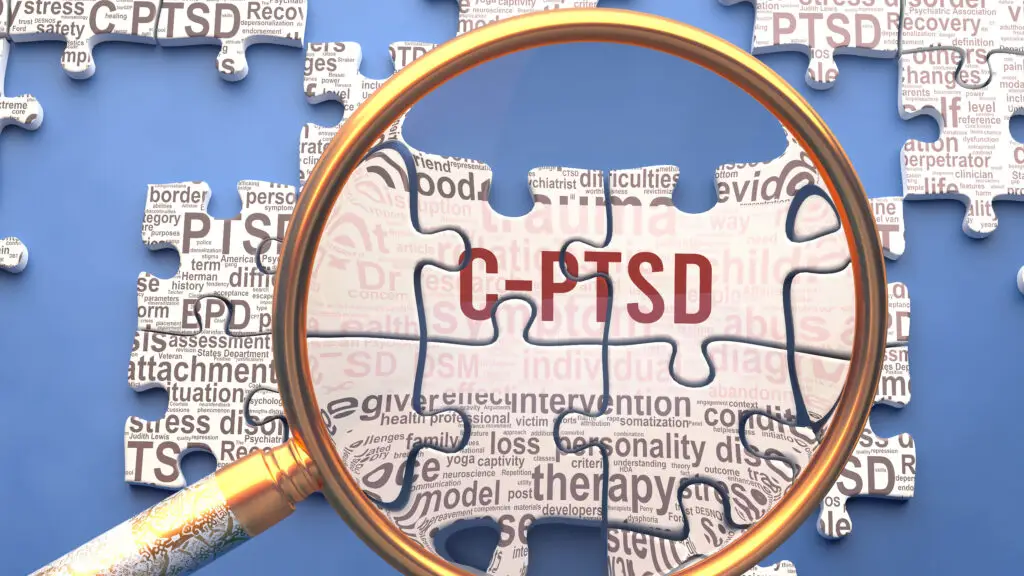Complex Post Traumatic Stress Disorder
How C-PTSD Develops
Complex PTSD develops in response to chronic traumatisation over the course of months or years. The trauma can include emotional, physical or sexual abuse. There are exceptional circumstances in which adults can develop Complex PTSD, but it is mostly seen in those whose trauma occurred in childhood. When children go through prolonged trauma the brain is still developing and it interrupts the natural course of their psychological and neurological development.
According to C-PTSD UK, some examples of causes of C-PTSD are:
- Repeated exposure to disaster, accidents, deaths or violent acts (including emergency service workers)
- Child abuse or neglect
- Frequent need to deliver traumatic news to others e.g doctors
- Living under severe threat for an extended period of time
- Being forced to be a sex worker
- Domestic abuse
- Cult membership
- Having to witness ongoing abuse or violence of another
- Regular and repeated exposure to verbal abuse, emotional abuse or threats
- Long-term exposure to bullying
- Kidnappings, hostage taking, prisoner of war
- Frequent sexual victimisation or abuse
- Regular, long-term feelings of captivation or powerlessness
Someone with a narcissistic parent will have had a few of these factors in their lives, such as child abuse and neglect, living under severe threat, witnessing the abuse of others, domestic abuse and long-term feelings of powerlessness. There will be long term exposure to bullying, controlling, demeaning, critical and devaluing behaviours. A narcissistic family can also be likened to a cult, with an authoritarian leader and a need to adhere to the beliefs and expectations of that leader who will be the most dominant parent. There is the threat of being shunned or outcast for not following the dogma.
Please see link to the website for PTSD UK below:
C-PTSD Symptoms
Psychological effects of Complex PTSD include hypervigilance, this is where the person is always on high alert both mentally and physically as they are constantly on the lookout for danger. They may have a hyper awareness of sounds, facial expressions or the atmosphere in a room. They may have an exaggerated startle response, or they may be triggered by people arguing or shouting. This will trigger the nervous system into producing all the chemicals necessary and getting the body ready for the fight, flight, freeze or submit response. Complex PTSD means the person can feel easily overwhelmed and less resilient to life’s issues. They may worry extensively about what may happen, they may have nightmares and flashbacks to the trauma, and they may feel depressed or hopeless about the future. They can also be irritable and quick to anger and may have problems sleeping.
Somatic Symptoms
Individuals with Complex PTSD are also vulnerable to physical symptoms that cannot be explained medically but are caused by their internal pain and stress. These somatic symptoms can include neck and back pain, headaches and migraines, gastrointestinal problems including irritable bowel syndrome. They may develop fibromyalgia which involves muscle pain, fatigue, and problems with sleep, memory, and mood.
Comorbidities
Complex PTSD very often co-occurs with dissociative disorders. Other common conditions it co-occurs with include borderline personality disorder, depressive or bipolar disorders, anxiety disorders, obsessive compulsive disorders, eating disorders and addictions.
PTSD or Complex PTSD
Therapy can help an individual who has PTSD or Complex PTSD. The International Trauma Questionnaire can help you to see which type you have. Please see link below.
Differences between PTSD and Complex PTSD
Judith Herman is a psychiatrist and author who first proposed Complex PTSD as a separate diagnosis from PTSD, she states:
“Observers who have never experienced prolonged terror, and who have no understanding of coercive methods of control, often presume that they would show greater psychological resistance than the victim in similar circumstances. The survivor’s difficulties are all too easily attributed to underlying character problems, even when the trauma is known. When the trauma is kept secret, as is frequently the case in sexual and domestic violence, the survivor’s symptoms and behavior may appear quite baffling, not only to lay people but also to mental health professionals. The clinical picture of a person who has been reduced to elemental concerns of survival is still frequently mistaken for a portrait of the survivor’s underlying character.”
Both PTSD and CPTSD involve the following symptoms; re-experiencing in the here and now, avoidance and a sense of current threat. CPTSD also involves affect dysregulation (this refers to a poor ability to manage emotional responses or to keep them within an acceptable range of typical emotional reactions), a negative self-concept and disturbances in relationships.




This Post Has 2 Comments
I think you have nailed it!! Well-done..
Thank you Heather. Much appreciated.